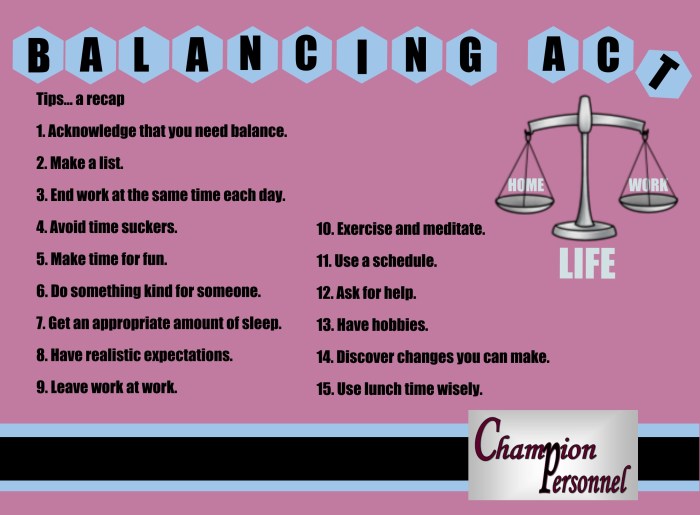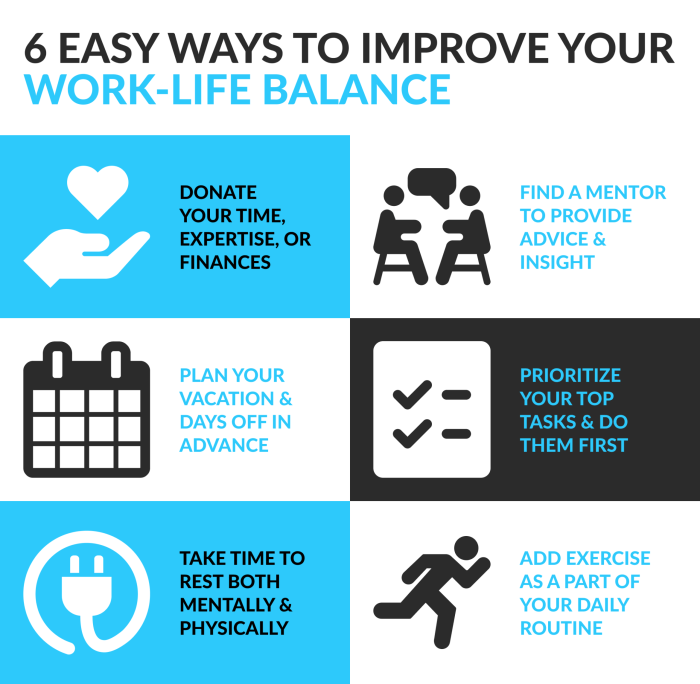Work-life balance tips are essential for a well-rounded life, offering insights into maintaining equilibrium between work and personal life. From setting boundaries to prioritizing self-care, these strategies will help you navigate the demands of a busy schedule with ease.
Importance of Work-Life Balance: Work-life Balance Tips
Maintaining a healthy work-life balance is crucial for overall well-being. It involves juggling the demands of work with personal life in a way that promotes mental and physical health.
Benefits of Work-Life Balance
- Reduced stress levels: Balancing work and personal life helps in reducing stress and prevents burnout.
- Improved mental health: Taking time for oneself outside of work improves mental well-being and overall happiness.
- Enhanced productivity: A balanced life leads to increased focus and productivity at work.
- Stronger relationships: Spending quality time with loved ones fosters stronger relationships and emotional well-being.
Impact of Imbalance on Health
- Increased risk of burnout: Working excessively without breaks can lead to burnout, affecting both mental and physical health.
- Higher stress levels: Imbalance between work and personal life can result in higher stress levels and anxiety.
- Health problems: Neglecting personal well-being due to work demands can lead to various health issues, such as hypertension and heart disease.
- Decreased quality of life: Having an imbalance between work and personal life can negatively impact overall quality of life and happiness.
Strategies for Achieving Work-Life Balance

In today’s fast-paced world, finding a balance between work and personal life can be challenging. However, by implementing some practical strategies, you can improve your overall well-being and productivity.
Setting Boundaries Between Work and Personal Life
One key strategy for achieving work-life balance is setting clear boundaries between your work and personal life. This means establishing specific hours for work and sticking to them, as well as creating designated spaces for work and relaxation.
- Avoid checking work emails or messages outside of work hours
- Communicate your boundaries with colleagues and supervisors
- Set aside time for personal activities and hobbies
Time Management Techniques
Effective time management is crucial for improving work efficiency and productivity. By prioritizing tasks and using time wisely, you can reduce stress and accomplish more in less time.
- Create a daily or weekly schedule to plan your tasks
- Use tools like calendars and task lists to stay organized
- Avoid multitasking and focus on one task at a time
Importance of Taking Breaks and Disconnecting
It’s essential to take breaks and disconnect from work to recharge and avoid burnout. By stepping away from work and engaging in activities that bring you joy, you can return to work feeling refreshed and motivated.
- Take short breaks throughout the day to rest and rejuvenate
- Unplug from technology during leisure time to fully disconnect
- Schedule regular vacations or time off to relax and recharge
Healthy Lifestyle Choices
Regular exercise, proper nutrition, mindfulness, stress reduction, and adequate sleep are all crucial components of maintaining a healthy work-life balance. These lifestyle choices can significantly impact your overall well-being and productivity.
Exercise and Nutrition
Regular exercise helps to reduce stress, improve mood, and boost energy levels. It can also enhance cognitive function and creativity, leading to better performance at work. Pairing exercise with a balanced diet rich in fruits, vegetables, lean proteins, and whole grains can further support your physical and mental health.
- Make time for at least 30 minutes of physical activity each day, whether it’s going for a walk, hitting the gym, or practicing yoga.
- Plan your meals ahead of time and prioritize nutritious options to fuel your body and mind throughout the day.
- Stay hydrated by drinking plenty of water and limit consumption of sugary drinks and caffeine.
Mindfulness and Stress-Reduction Techniques
Incorporating mindfulness practices and stress-reduction techniques into your daily routine can help you stay present, focused, and calm amidst the chaos of work and personal responsibilities. These practices can improve your emotional well-being and resilience.
- Try meditation, deep breathing exercises, or yoga to center yourself and reduce stress levels.
- Practice gratitude by keeping a journal and reflecting on the positive aspects of your life.
- Set boundaries and learn to say no to tasks or commitments that may overwhelm you.
Importance of Sleep
Getting enough quality sleep is essential for maintaining a healthy balance between work and life. Sleep deprivation can lead to decreased cognitive function, mood disturbances, and overall decreased productivity.
- Aim for 7-9 hours of sleep per night to allow your body and mind to rest and recharge.
- Create a relaxing bedtime routine to signal to your body that it’s time to wind down and prepare for sleep.
- Avoid screens and stimulating activities before bed to promote better sleep quality.
Remote Work and Work-Life Balance

Working from home can blur the lines between our personal and professional lives, making it crucial to establish boundaries to maintain a healthy work-life balance. Creating a separate workspace and managing distractions are key strategies to ensure productivity while working remotely.
Tips for Maintaining Boundaries
- Set specific work hours and stick to them to avoid overworking.
- Communicate your availability to colleagues and family members to prevent interruptions.
- Create a dedicated workspace away from common areas to signal the start and end of the workday.
Creating a Separate Workspace, Work-life balance tips
- Choose a quiet and well-lit area in your home to set up your home office.
- Invest in ergonomic furniture and equipment to maintain good posture and reduce physical strain.
- Add personal touches to your workspace to make it more inviting and conducive to productivity.
Managing Distractions and Staying Focused
- Use noise-canceling headphones or white noise machines to block out distractions.
- Break tasks into smaller chunks and set specific goals to stay on track.
- Take regular breaks to recharge and avoid burnout, incorporating short walks or stretching exercises into your routine.